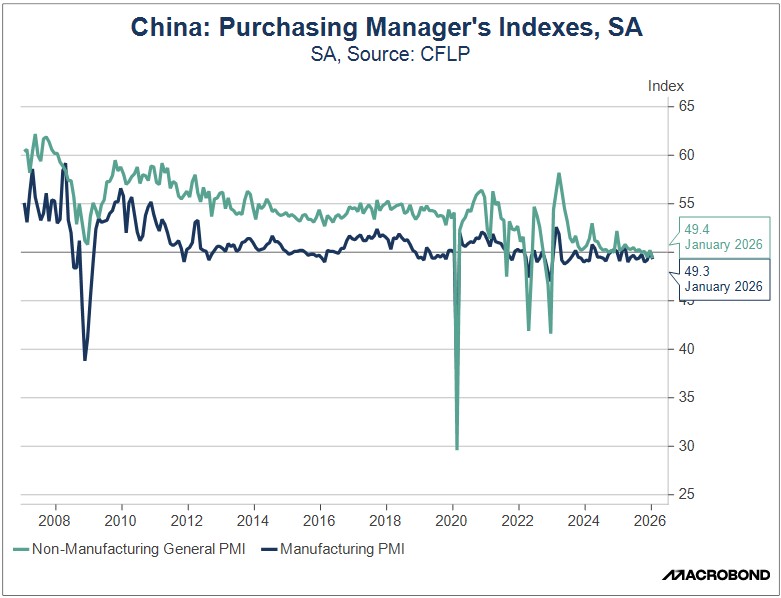by Patrick Fearon-Hernandez, CFA, and Thomas Wash
[Posted: 9:30 AM ET] | PDF
Our Comment today opens with some quick notes on the monumental election in Japan yesterday. We next review several other international and US developments with the potential to affect the financial markets today, including a recap of elections in Thailand and Portugal, growing signs that UK Prime Minister Starmer may need to resign, and new data confirming that US software firms are facing increased financial stress.
Japan: In elections yesterday, the ruling Liberal Democratic Party of Prime Minister Takaichi won in a landslide, securing an estimated 316 of the 465 seats in the lower house, up from 198 seats previously. This marks the first time since World War II that a party has won a 2/3 super majority in the Diet. The conservative Takaichi will also have support of her coalition partner, the Japan Innovation Party. The result is likely to be positive for Japanese stocks and the yen, as it supports Takaichi’s plan for more stimulative fiscal and monetary policies.
- Indeed, Japanese stocks are soaring so far this morning, with the Nikkei 225 price index up about 3.9% to a new record high.
- The yen has strengthened about 0.8% to 155.99 per dollar ($0.0064).
Thailand: In another election at the weekend, the conservative Bhumjaithai Party came out on top with an estimated 194 seats in the 500-seat legislature, while the progressive People’s Party will end up with only about 115. The results mark a dramatic return to conservatism after many years of liberal rule in Thailand.
Portugal: In yet another weekend election, Socialist António José Seguro won the presidency with approximately 65% of the vote, holding off right-wing nationalist André Ventura. All the same, the presence of the far-right Ventura on the ballot is being taken as a warning that populist conservatives have a following in Portugal and could drive policy to the right in the coming years.
United Kingdom: Prime Minister Starmer has now lost two high-level aides over their part in recommending that he name Lord Peter Mandelson as UK ambassador to the US — a toxic nomination given Mandelson’s prominent place in the Epstein files recently released by the Justice Department. Today’s resignation was from Tim Allan, who was Starmer’s communication director. Just one day earlier, Morgan McSweeney resigned as chief of staff. As a result, Starmer is coming under increasing political pressure to resign.
- Even though Starmer had already sacked Mandelson, the new staff resignations are adding to the political pressure from a series of scandals and policy missteps.
- Nevertheless, the potential exit of the Labour Party prime minister has so far been taken in stride by investors, with UK stock indexes and the pound continuing to appreciate. Those trends suggest investors could well look favorably on a political change in the UK, despite some short-term volatility if Starmer is forced to resign.
US Immigration Policy: According to the Financial Times, the US Embassy in London and other embassies around the world have begun to deny visas to even top business executives on the basis of past arrests for relatively minor criminal infractions, such as barfights and marijuana possession. Some visas to visit the US have reportedly been denied even for minor arrests as far back as the 1970s.
- Of course, the administration’s barriers to trade, technology, and capital flows are much higher in profile.
- Nevertheless, the new restrictions would presumably slow cross-border economic activity, including the inbound investment that the White House is seeking.
US Software Industry: New research from Axios shows that an increasing share of the loans backing software firms are trading at “distressed” levels, or below 80 cents on the dollar. The data indicates that $25 billion in software loan volume was marked at distressed levels by the end of January, more than double what it was in December. While technology leaders have begun to push back on the recent concerns that artificial intelligence will devastate software companies, these hard data points would suggest that real problems exist.
Chinese Food Policy: New data shows the proportion of soybean meal in domestically produced animal feed stood at 13.4% in 2025, unchanged from the previous year despite government efforts to replace the largely imported material with other sources of protein. The government’s effort aims to make China less reliant on foreign food supplies, but the new figures suggest the country remains quite reliant on supplies from the US and Brazil, giving them some leverage in trade negotiations and other disputes.
Chinese Demographics: As the country continues struggling to arrest its steep drop in birth rates, which has led to an aging population and outright population declines, the government has reportedly imposed a 13% value-added tax on condoms and other contraceptives, ending their previous tax-free status. However, we haven’t seen the intimate details of the change, so we won’t comment further.



